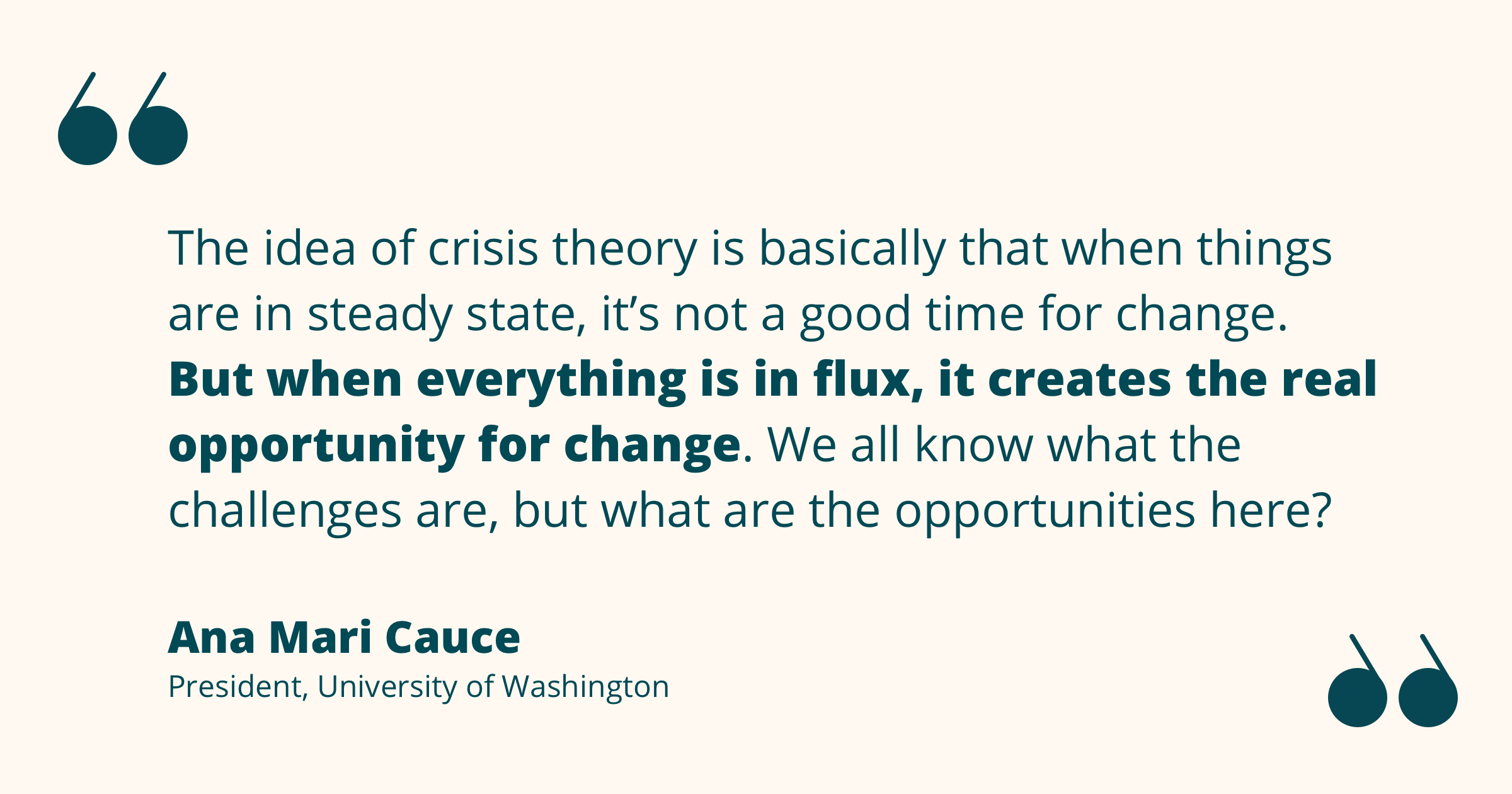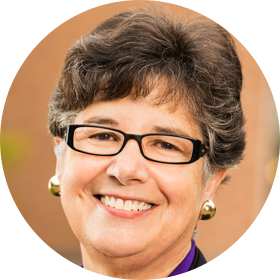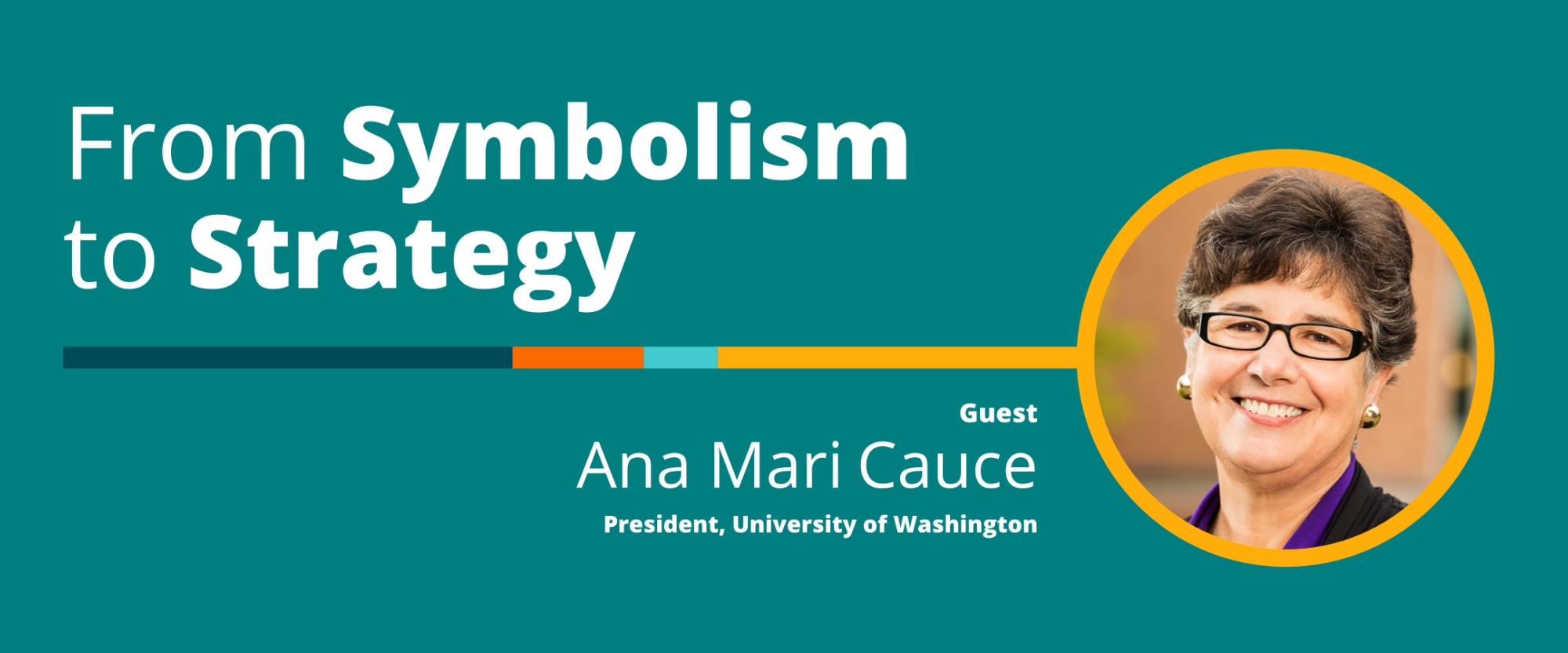Note: This interview, Episode 12 of the Weekly Wisdom Series, originally aired on July 13, 2020 as part of the University Innovation Alliance’s Innovating Together podcast, appearing live on Facebook, Twitter, and LinkedIn.
As Executive Director of the University Innovation Alliance (UIA), I'm excited to partner with Inside Higher Ed as we present the Innovating Together Podcast. This broadcast includes the Weekly Wisdom series, in which we feature conversations with noted higher education leaders. My co-host for Episode 12 was Rick Seltzer, Project Editor with Inside Higher Ed, and we spoke with Dr. Ana Mari Cauce, President of the University of Washington. As someone who joined the faculty in 1986 as a professor of Psychology and American Ethnic Studies, President Cauce's deep familiarity with the institution she now leads has brought her great perspective and wisdom during the turbulence of the COVID-19 pandemic and the national movement for equity and social justice sparked by the death of George Floyd. Our conversation with her gave us hope in this time of uncertainty.
Communications With an Asterisk
Like so many higher ed leaders we've interviewed, President Cauce stressed the need for clear communication with U.W.'s students and their families during this challenging time. "There are times when you worry about over communicating, and this is not one of them," she said. "We’re trying to communicate in various modalities – emails to students and to their parents, town halls. We’ve created a video tour of what the dorms are going to look like. And then, also, always making it clear that every single one of our communications comes with an asterisk. It’s no longer a Plan A and a Plan B. There’s got to be a Plan C, D, and E. People want to hear consistency in communications, and the truth is that, as much as I’d like to think that I’m in charge, right now COVID is in charge."
Turning Symbolism Into Strategy
President Cauce's background in community psychology has informed her leadership strategy in 2020. As she explained it, "The idea of crisis theory is basically that when things are in steady state, it’s not a good time for change. But when everything is in flux, it creates the real opportunity for change. We all know what the challenges are, but what are the opportunities here? For example, some people have been resistant to doing anything online. And all of a sudden, we’ve been forced to go online. In a couple-of-week period, we took 7,000 courses and put them all online. I think in-person is the way to go, but I think people have been finding that online a good addition – and these are people who would have never, never gone there.

"So, we’ve seen a real flexibility in how we as a university have responded," she continued. "We have also seen a real willingness to look at systemic racism in a much more serious way than I’ve seen in quite a long time. We’ve seen name changes, statues coming down, etc. And for some of the students that we're most interested in bringing into our universities, not having to look at a Confederate statue can be part of creating an inclusive environment. So I don't want to downplay that. In academia, where we still wear caps and gowns, we realize that symbolism is important."
President Cauce admitted that, while symbolic changes are a good start, the next steps are critical. "Universities around the country are looking at different ways in which we might be dealing with public health issues and policing," she told us, adding, "We have decided that we’re not going to use SATs as a requirement going forward. And we're really rethinking the whole notion of meritocracy. Are we defining merit in a way that is privileging? We already have a holistic admissions, but let’s rethink some of the pieces of that. And we’re having a serious discussion amongst top-ranked universities about U.S. News and World Report rankings. We all talk about how we want to be more inclusive, and yet we’re all part of a ranking system that gives you points simply for being selective. And so I think that this has created some real opportunities for change, and that’s what I’m trying to focus on."
How to Keep the Job Fresh
We've noticed a high number of institutional leadership changes during the pandemic, and we asked President Cauce, who began her current role at U.W. in an interim capacity, if she had any advice for interim higher ed leaders.
"Quite frankly I wasn’t sure in the early stages whether I wanted the permanent job or not," she recalled. "We’re all interims. The difference is that I have a contract. And so I think that the best way of knowing whether this is the right job for you, and other people knowing you're the right person for the job, is to approach it not as if you’re running for the job, but to approach it as if you have the job. So, for example, I launched a Race and Equity Initiative in the middle of my interim presidency, which was really a pretty risky thing to do. But I wanted to know, 'OK, how is this going to come across?' And it’s actually been fabulous because we’ve had some structures in place that we can draw upon now as we are going through the other pandemic, which is actually deeper and longer lasting – the pandemic of racism in this country. So I just really think that the idea of playing it safe in an interim role is probably not the best idea."
President Cauce, serving as U.W.'s appointed leader since 2015, was eager to share her thoughts on how she remains effective. She began with her work on accreditation committees for the University of California - Los Angeles, the University of Toronto, and the University of British Columbia, and how that gave her perspective about other institutions. "For me, I can’t imagine having this job at a university that I hadn’t been in," she concluded. "There are faculty who have known me since I was a pup, and so they feel very comfortable telling me, 'What the heck are you doing?' And giving me that kind of feedback. When you’re in a position of authority like this, people tiptoe around you. I really feel that the best gift that someone can give you is the gift of honesty. And that can be hard to get when you come in at the top. One of the disadvantages could be that you only know what’s around you. And so I think that it’s really important to get out, visiting other campuses. There are groups of presidents that meet regularly. And you build your leadership team. We certainly have deans, etc. that have risen internally, but we also bring them in from the outside, and that helps."
Envisioning a Way Forward
These are dire times, yet President Cauce is feeling positive about the creativity and imagination she sees as people move out of their comfort zone. "I always say I want us to be the top public university in the world in terms of impact," she said. "Our Institute of Health Metrics and Evaluation started modeling resource use for the hospitals, and now they’re modeling things like the effects of masks, etc. And going from theory to impact, how the work that you’re doing in the lab makes a difference in the world, really requires much more interdisciplinary work. The problems that we’re facing in the world right now are way too complicated to just use one discipline. One of my presidential initiatives, Population Health, was an interdisciplinary approach to looking at health as not just a function of individuals, but of communities. And that has proven to be very, very helpful in this pandemic context. So I hope that we can realize the incredible importance of having a safety net for this country, because we’re all interrelated."
President Cauce noted that, despite the appearance of universities pursuing many different strategies during the pandemic, everyone's response is similar. "At the end of the day, almost everyone is going hybrid," she said. "For example, we are bringing students back, but the bulk of our courses will be online, simply because to do the kind of distancing that we need is not going to allow us to bring in more than 20 to 25 percent of courses in person. For the student who wants to go 100 percent online, they can do that. I mean, we are not forcing anybody to come on campus. We’re always balancing a set of risks. There are physical health risks from COVID that are very, very real. But the rates of anxiety and depression amongst young people are absolutely through the roof. And we are social creatures, and we are meant to be together. We need to develop a culture on campus where our students themselves are involved in risk reduction. I think we have a group of students that, if we work with them closely to develop a culture where risk behavior goes down, I’m very optimistic about the kind of culture we can have on campus."
It's All About the Students
President Cauce was happy to note that the push to reopen college campuses is coming primarily from the students themselves, which makes the craziness of what she calls the "corona-coaster" worth the dizzying ride. "I think that what keeps me going is the young people," she told us. "As we get older, we can get a little jaded, etc. But I think that the kind of idealism that young people have, and their determination to meet a whole range of challenges head on – the pandemic, environmental challenges, systemic racism – they are unafraid. And that to me is just so incredibly refreshing, and it’s so energizing, and it keeps me young."
Links Mentioned in This Episode
• University of Washington
• Death of George Floyd (as reported in TIME magazine)
• Statues coming down (as reported in The Washington Post)
• Not going to use SATs as a requirement (U.W.'s policy change on standardized test scores)
• U.S. News and World Report rankings (a high-profile rating system for higher ed institutions)
• Institute of Health Metrics and Evaluation (U.W.'s independent population health research center)
Bios of Guest and Co-Hosts

Guest: Ana Mari Cauce, President, University of Washington
Dr. Ana Mari Cauce has led the University of Washington since 2015, selected as the institution's 33rd president after seven months of serving in an interim capacity. She holds the distinction of being U.W.'s first woman, gay, and ethnic minority president. She has advanced the university's mission in providing a leading-edge student experience, conducting globally significant research and scholarship, upholding U.W.’s dedication to its public mission, and championing its commitment to innovation. She joined the faculty in 1986 as a professor of Psychology and American Ethnic Studies, with secondary appointments in the Department of Gender, Women and Sexuality Studies and the College of Education. She was appointed as director of the U.W. Honors Program, chair of American Ethnic Studies, chair of Psychology, and executive vice provost and dean of the College of Arts and Sciences. In 2011, Dr. Cauce was named university provost and executive vice president, responsible for overseeing the education, research, and service missions of the university’s schools, colleges and other academic units. She has championed access to higher education through initiatives such as the Husky Promise, and has promoted future forward curriculum through the Global Innovation Exchange in partnership with Tsinghua University in Beijing. For her teaching, scholarship and advocacy, Dr. Cauce has received numerous awards, including the Dalmas Taylor Distinguished Contribution Award, the Luis Fernando Esteban Public Service Award, the James M. Jones Lifetime Achievement Award of the American Psychological Association, the Grace Hopper Exemplary Leadership Award, and the Distinguished Contribution Award from the Society for Community Research and Action. Dr. Cauce was born in Cuba and emigrated to Miami with her family. She earned a B.A. in English and psychology from the University of Miami, and a Ph.D. in psychology, with a concentration in child clinical and community psychology, from Yale University. Despite her administration role at U.W., she remains active in the classroom and continues to teach and mentor undergraduate and graduate students.

Co-Host: Bridget Burns, Executive Director, University Innovation Alliance
Dr. Bridget Burns is the founding Executive Director of the University Innovation Alliance (UIA). For the past decade, she has advised university presidents, system chancellors, and state and federal policy leaders on strategies to expand access to higher education, address costs, and promote completion for students of all backgrounds. The UIA was developed during Bridget’s tenure as an American Council on Education (A.C.E.) Fellowship at Arizona State University. She held multiple roles within the Oregon University System, including serving as Chief of Staff and Senior Policy Advisor, where she won the national award for innovation in higher education government relations. She was a National Associate for the National Center for Public Policy and Higher Education, and has served on several statewide governing boards including ones governing higher education institutions, financial aid policy, and policy areas impacting children and families.

Co-Host: Rick Seltzer, Projects Editor, Inside Higher Ed
As Projects Editor, Rick Seltzer covers business and management for Inside Higher Ed. He joined the publication in 2016 after working as a money and general-assignment reporter for The Baltimore Business Journal. Previously, he was a business reporter for The Bloomington Herald-Times, and he covered small business and health care for the Central New York Business Journal. Rick, a native of South Central Pennsylvania, started his career as a local beat reporter for The Harrisburg Patriot-News. He graduated from Syracuse University in 2008 after interning at the Patriot-News and The Syracuse Post-Standard.
About Weekly Wisdom
Weekly Wisdom is an event series that happens live on Facebook, Twitter, and LinkedIn. It also becomes a podcast episode. Every week, we join forces with Inside Higher Ed and talk with a sitting college president or chancellor about how they're specifically navigating the challenges of this moment. These conversations will be filled with practicable things you can do right now by unpacking how and why college leaders are making decisions within higher education. Hopefully, these episodes will also leave you with a sense of optimism and a bit of inspiration.
Rate, Review & Subscribe
Learn why hundreds of people have rated this new podcast 5 stars! Please join others and rate and review this podcast. This helps us reach and inform more people -- like you -- to help increase the number and diversity of college graduates in the United States.
Click here, scroll to the bottom, tap to rate with five stars, and select “Write a Review.” Then be sure to let us know what you loved most about the episode! Also, if you haven’t done so already, subscribe to the podcast. We’ll be adding a bunch of bonus episodes to the feed and, if you’re not subscribed, there’s a good chance you’ll miss out.

